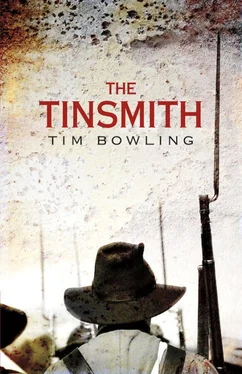At first, he could not tell where he was or who the dying men were, but by lying still and listening, he soon understood his situation. The accents and uniforms told him he lay among wounded soldiers of the South, and he assumed that he was still near home, where the great battle had been fought and where the overseer, Orlett, had died. But the why of his situation remained a mystery. He was neither a Rebel soldier nor even wounded. He lay motionless in the ceaseless fly drone and watched the grimy canvas over him brighten and darken with the hours.
That gradual change—and the play of shadow as the kind-faced, sad-eyed man moved among the groaning forms, dispensing whisky and pills and soft words—took him further back, to the beginning of his memories. Outside Daney and Caleb’s shack, that huge pile of sawdust, soft, with some wood chips in it, layered in it like the feathers in a goose. A pile he had to tilt his head back to see the top of. In the rain, watching that pile turn from yellow to almost blood red. Then, holding some sawdust in his hand taken from inside the pile. Its paleness like his own. He’d stare at the dust in his hand, trying to capture exactly when the colour changed. But the blood red just happened, as if he’d closed his eyes. The sawdust would be heavier, just a little, like rape seed. He’d stick his hand back into the pile, plunge it deep to where the dust was still yellow and dry and light. If it rained hard enough and long enough, the whole pile changed and he’d sit beside it, drenched, breathing in the sweet, wood-scented air, blinking up to catch the flight of a trilling oriole—its song behind his eyes—but he couldn’t hold it like the dust. He couldn’t feel it that same way. Only the dust… the colours changing… the weight… his hand plunging deeper, till it came out like Caleb and Daney’s, darker than any blood, even the hog’s blood in the barn, but spreading over him like that hog’s blood, like the light over the fields…
Now a shadow passed, hovered. A broad hand, slightly damp, lowered to his forehead, a kind voice asked if he’d like some water. He closed his eyes, and it was Daney instead, her smell—of sweat and earth, the moist wool of the shift she’d made for herself, and the tang of okra.
• • •
She sat on a plain bench in the dirt-floored, rough-lumbered shack with mud stuck in the chinks of the walls, shelling peas into a tin pan and laughing at Lute, the yellow hound at her feet, sighing and whining in his sleep, sometimes waking enough to snap at the flies circling in the syrup-thick air. Daney’s laugh was deep and rich—the way a river would laugh if it could, Caleb always said. Daney laughed more than the other slaves, but it wasn’t always an easy laugh. John hadn’t known when he first understood the difference, when he had learned that a laugh could be a weapon too. Daney always said she could bear anything so long as her children were not taken from her. And she never used her laugh as a weapon inside the family. Not once. She was a stout, strong, yellow-skinned woman with a wide gap between her front teeth. Her hands were quick, small skillets of melted butter. Her bosom was large and soft from many years of nursing, and she had a way of turning and looking over her shoulder just exactly when you didn’t want her to see what you were doing. Caleb adored her. He said, “You g’wan, you talk to Daney, she knows,” more than he said anything else. But Caleb didn’t say much. He was starless black and tall, and the bones showed sharp in his long face. He liked nothing better than to take the young children on his knee and sing them songs about grasslands and lions that had been sung to him by his grandfather.
John did not stay with Daney and Caleb in their shack in the slave quarters a half-mile down the dirt road to the fields. He did once, but that was a long time ago, when he could sit by the sawdust pile and watch it change. For years he had stayed at the big house in a neat, pine-scented room off the kitchens and had done the tasks of a house servant, but he worked hard in the fields and barn too when needed. Some said the master kept him at the house exactly because he was so light-skinned, they said the master felt embarrassed having such a bright nigger living with the darkies; it might seem to the other white folks that he didn’t know and respect the difference. Once Jabeth the freedman snickered out of his wrinkled, peanut-shaped face and said that maybe the master’s embarrassment meant a lot more than skin colour. But Daney had shut him up fast. She had laid her sewing by and crossed her bare forearms and said that she’d been on this farm a long time and there was no goings-on she didn’t know about. Later, she told John that he’d been bought and brought to the farm from Baltimore when he was but a baby and nobody knew who his father and mother were. Later still, when he was old enough, she told him that his parents were probably sold at auction the same time he was, and probably into the South to work on a cotton or tobacco plantation. It did no good to think about it, but it was important to know the truth so you wouldn’t get any wrong ideas about what being a slave really meant. She said, it doesn’t matter how easy your life might be now, but when you’re a slave you’d better know change will come, and most times it’s hard. But it was no good thinking on it too much. Weren’t she and Caleb always so good to him and the master as kind as could be expected? He ought to be grateful that he hadn’t been sold into the South too. He should thank the Lord every day that his lot was as good as a slave’s could be. Even when he was hired out at times, and only ever a few miles away—to Sharpsburg or Shepherdstown—didn’t the master choose good situations where a slave could learn woodcraft and tinsmithing and other useful skills? Yes, Daney insisted, he ought to be grateful that things weren’t a lot worse.
By then, by the winter of 1859, John was sixteen and not a boy anymore, and he could listen to the talk of the white folks and the blacks too and know that nothing caused more excitement than the possibility of a war breaking out. Sometimes it was all anyone talked about. John understood that it made the white folks angry and nervous; they mostly didn’t see how any good could come of it. The master sometimes asked him after such long and heated talks if he wasn’t happy with his lot, if Daney and Caleb and the others weren’t happy too. Didn’t he treat them well? Hadn’t he always done so? They wouldn’t have any reason to run off, would they? As time went on, the master asked such questions more often, and he grew increasingly agitated, his voice almost pleading, his eyes wet. His skin looked like a china doll’s with cracks. And the tracks were always glazed with tears, the thin lips always trembling, the sparse white hairs on the tiny, bony chin a sign that the master wasn’t looking after himself proper anymore.
For his part, John did not know what to think about a war. When he listened to Daney and some of the other blacks, he could feel their excitement and hope for freedom inside himself, a kind of warmth, as of a change from winter to spring. Daney said that a war would change everything for the better, that it would lead to the promised land. And she laughed more. All the black folks were happier, even after a new overseer was hired and punishments for misdeeds, such as not working hard enough or fast enough, were increased. Some of the free blacks in the area, though, were sullen. Jabeth said that if he’d known freedom was coming he would have just waited and not spent his hard-earned wages on something that he was going to get anyhow. But Caleb didn’t like the talk or even Daney’s laughs. He said there was nothing that important that ever came easy, and if those fool niggers thought the white folks was just going to fold their hands and bow as the black folks packed their belongings and walked away, well, he wasn’t that much of a fool. And besides, where was there to go? Daney said he was just getting old and tired and it was a good thing she had enough life in her for both of them when the time came, as it surely would. Caleb never argued about that. If Daney said a thing would happen, he didn’t question it.
Читать дальше












